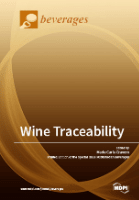
Beverages
Scope & Guideline
Advancing Knowledge in Beverage Innovation
Introduction
Aims and Scopes
- Fermentation Science and Technology:
Research on fermentation processes, including the use of different microorganisms and fermentation conditions to enhance the quality and characteristics of beverages such as beer, wine, and kombucha. - Sensory Analysis and Consumer Preferences:
Studies examining the sensory profiles of beverages, consumer acceptance, and the influence of packaging, labeling, and marketing on consumer choices. - Nutraceuticals and Functional Beverages:
Exploration of health-promoting attributes of beverages, including the incorporation of bioactive compounds and the development of functional drinks aimed at specific health benefits. - Innovative Processing Techniques:
Research on advanced processing methods such as pulsed electric fields, non-thermal techniques, and innovative fermentation strategies to improve beverage quality and safety. - Sustainability and Waste Utilization:
Assessment of sustainable practices in beverage production, including the use of by-products and waste materials to create value-added products and reduce environmental impact.
Trending and Emerging
- Health and Wellness Beverages:
Growing interest in beverages that promote health benefits, such as functional drinks enriched with probiotics, antioxidants, and other bioactive compounds. - Sustainable Practices and Circular Economy:
Increased focus on sustainability, including waste valorization and the use of by-products in beverage production, reflecting a broader industry trend towards environmental responsibility. - Technological Innovations in Beverage Production:
Emerging research on new technologies, such as machine learning and advanced extraction methods, to enhance beverage quality and efficiency in production processes. - Consumer Behavior and Marketing Strategies:
In-depth studies on consumer preferences and behavior, particularly in relation to craft beverages and alternative products, indicating a shift towards personalized marketing approaches. - Diversity in Beverage Ingredients:
Exploration of non-traditional ingredients, such as plant-based alternatives and novel fermentation substrates, highlighting the diversification of beverage formulations in response to consumer demand.
Declining or Waning
- Traditional Beverage Methods:
Research focusing solely on traditional methods of beverage production, as there is a growing emphasis on innovative and sustainable approaches that incorporate modern technologies. - Single Ingredient Studies:
Papers that examine beverages based on a single ingredient are less prevalent, with a shift towards interdisciplinary studies that explore complex interactions between multiple components. - General Beverage Consumption Patterns:
While still important, broad studies on beverage consumption patterns without specific context (such as health impacts or sensory evaluations) are appearing less frequently in favor of more detailed, targeted investigations.
Similar Journals

JOURNAL OF FOOD SCIENCE AND TECHNOLOGY-MYSORE
Transforming Ideas into Food SolutionsJOURNAL OF FOOD SCIENCE AND TECHNOLOGY-MYSORE, published by SPRINGER INDIA, is a distinguished peer-reviewed journal that has been contributing to the ever-evolving field of food science since its inception in 1974. With an ISSN of 0022-1155 and E-ISSN 0975-8402, this journal holds a commendable position in the Q2 category for Food Science, as per the 2023 metrics, and ranks #58 out of 389 in Scopus's Agricultural and Biological Sciences sector, achieving an impressive 85th percentile. The journal publishes high-quality research articles, reviews, and case studies that cover a wide array of topics, from food preservation to innovative technologies in food processing. Although it is not an open-access journal, it endeavors to disseminate essential knowledge and research strategies that advance food science and benefit both industry professionals and academia. The geographical reach of the journal, alongside its rigorous editorial standards, solidifies its stature as a pivotal resource for researchers, professionals, and students dedicated to the enhancement of food science practices and technologies.

CZECH JOURNAL OF FOOD SCIENCES
Fostering Collaboration in Food Science InnovationCzech Journal of Food Sciences is a premier publication in the field of food science, disseminating vital research since its inception in 1999 and transitioning to Open Access in 2007. Published by the Czech Academy Agricultural Sciences, this journal facilitates the exchange of knowledge among researchers, professionals, and students dedicated to advancing the understanding of food systems, safety, and technology. With an ISSN of 1212-1800 and an E-ISSN of 1805-9317, it holds a respectable position with a Q3 ranking in the Food Science category for 2023, illustrating its commitment to high-quality research despite its Scopus rank of 209 out of 389, situated in the 46th percentile. Located in the heart of the Czech Republic, at TESNOV 17, PRAGUE 117 05, this journal serves as an essential resource for those involved in agricultural and biological sciences, paving the way for innovative discoveries and applications in food science.

Ukrainian Food Journal
Elevating nutrition knowledge for a healthier future.Ukrainian Food Journal is an esteemed open-access journal dedicated to advancing the field of food science and biochemistry. Established in 2012 and published by the National University of Food Technologies in Ukraine, the journal serves as a vital platform for researchers and professionals to disseminate their findings on food technology, safety, and nutritional biochemistry. With an ISSN of 2304-974X and E-ISSN 2313-5891, it offers a wealth of knowledge to its readers, promoting innovation and collaboration within the industry. While currently categorized within the Q4 quartile of biochemistry and the Q3 quartile of food science, the journal is progressively gaining recognition, reflecting a commitment to quality research in a competitive field. The journal is indexed in Scopus, ranking #271 in Food Science and #376 in Biochemistry, underscoring its relevance and contribution to agricultural and biological sciences. The Ukrainian Food Journal not only enriches the academic community with its open-access model but also aims to foster dialogue among researchers, professionals, and students dedicated to improving food systems and nutrition. It operates from its headquarters in Kyiv, offering a hub for creativity and advancement in food-related research.
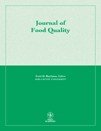
JOURNAL OF FOOD QUALITY
Nurturing Quality and Safety in Food ResearchThe Journal of Food Quality, an esteemed publication under Wiley-Hindawi, stands as a vital resource in the dynamic field of Food Science, established since 1977 and operating under an Open Access model since 2017. With its seat in the United Kingdom, this journal focuses on delivering high-quality research and insights pertaining to food safety, risk management, and quality assurance, reflected in its impressive Q2 ranking in both Food Science and Safety, Risk, Reliability and Quality categories in 2023. Researchers and professionals will find the journal’s contributions indispensable, particularly given its Scopus rankings that place it in the top echelons of its fields, highlighting its impact and relevance. By fostering an environment of knowledge sharing, the Journal of Food Quality not only enhances academic dialogue but also supports innovation and best practices in food research and industry applications.

Journal of Food and Nutrition Research
Exploring Innovations in Dietary Practices and HealthJournal of Food and Nutrition Research, published by the VUP FOOD RESEARCH INST in Bratislava, Slovakia, serves as a vital platform for disseminating cutting-edge research in the fields of food science and nutrition. With an ISSN of 1336-8672 and an E-ISSN of 1338-4260, this journal emphasizes the importance of interdisciplinary approaches to address contemporary challenges related to food quality, dietary practices, and nutritional health. Notably recognized in the 2023 Scopus rankings, the journal is classified in Q3 quartiles for both Food Science and Nutrition & Dietetics, providing a forum for researchers aiming to enhance knowledge and practices within these domains. Those engaged in academia and industry will find the journal invaluable for its comprehensive scope, which covers novel food technologies, nutrition interventions, and the implications of dietary behaviors. Though not open access, the journal is dedicated to enriching the academic conversation and contributing to advancements in public health and nutrition policies.
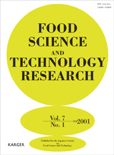
FOOD SCIENCE AND TECHNOLOGY RESEARCH
Elevating Standards in Food Safety and QualityFOOD SCIENCE AND TECHNOLOGY RESEARCH, published by the Japanese Society of Food Science & Technology, is a pivotal journal that encompasses a wide spectrum of research in the fields of food science, biotechnology, and engineering. With its ISSN number 1344-6606 and a digital counterpart E-ISSN 1881-3984, this journal aims to disseminate cutting-edge research and innovative technologies that enhance food safety, quality, and sustainability. Recognized for its contributions, it holds a Q3 category ranking in multiple disciplines, including Food Science and Biotechnology, indicating a significant role in advancing academic discourse. Researchers and professionals can benefit from its insights, as the journal covers an array of topics relevant to industrial applications, marketing strategies, and scientific advancements. Although not an open-access journal, it has a wide reach and is committed to providing high-quality, peer-reviewed content essential for scholars and practitioners in the food science community from 1999 to 2024.
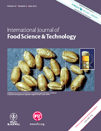
INTERNATIONAL JOURNAL OF FOOD SCIENCE AND TECHNOLOGY
Advancing the Future of Food Science and TechnologyINTERNATIONAL JOURNAL OF FOOD SCIENCE AND TECHNOLOGY, published by WILEY, serves as a premier platform for the dissemination of cutting-edge research in the field of food science and technology. With an ISSN of 0950-5423 and E-ISSN 1365-2621, this journal has been committed to publishing high-quality research since 1966 and is set to continue its impactful contributions through 2024. Recognized for its excellence, it holds a Q1 ranking in Food Science and a Q2 ranking in Industrial and Manufacturing Engineering as of 2023. The journal ranks #95/384 in Industrial and Manufacturing Engineering and #100/389 in Food Science on Scopus, placing it within the top quartiles of these fields. Although it does not currently offer Open Access, researchers and professionals benefit from access to a wealth of knowledge that advances understanding in both applied and theoretical aspects of food science. This journal is indispensable for anyone in the academic and professional domains who seeks to stay abreast of innovations and trends shaping the food industry.
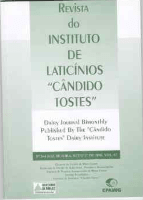
Journal of Candido Tostes Dairy Institute
Exploring New Frontiers in Dairy TechnologyJournal of Candido Tostes Dairy Institute, published by the prestigious INST LATICINIOS CANDIDO TOSTES, has established itself as a vital resource in the field of dairy science and technology. This Open Access journal, operating since 2008, provides an inclusive platform for researchers, professionals, and students to share groundbreaking findings and innovative practices related to dairy production, processing, and quality. Located in Brazil, this journal aims to advance knowledge and standards within the dairy industry, ensuring global access to high-quality, peer-reviewed research. The journal not only contributes to the scientific community but also supports practical advancements that benefit dairy producers and consumers globally. By fostering collaboration among scholars and practitioners, the Journal of Candido Tostes Dairy Institute plays a crucial role in shaping the future of dairy sciences. We encourage contributions that explore novel aspects of dairy research, thereby bridging theoretical insights with industry applications.
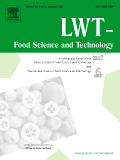
LWT-FOOD SCIENCE AND TECHNOLOGY
Championing excellence in food science research.LWT - Food Science and Technology is a premier academic journal published by Elsevier, specializing in the multifaceted fields of food science and technology. With a distinguished presence since its inception in 1973, this journal has evolved to become a vital resource for researchers and professionals aiming to advance knowledge in food safety, preservation, processing, and sensory analysis. Currently ranked in the Q1 quartile of food science journals, it holds an impressive Scopus ranking of 22 out of 389 in the Agricultural and Biological Sciences category, placing it in the 94th percentile. While certain articles may be available via subscription, LWT is committed to disseminating cutting-edge research that enhances food quality and innovation. This journal not only serves as a critical platform for the exchange of scientific ideas but also addresses contemporary challenges in food technology, ensuring that it remains essential for scholars, industry professionals, and students alike seeking to contribute to and stay abreast of advancements in the field.
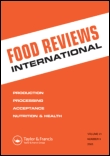
FOOD REVIEWS INTERNATIONAL
Exploring Innovations for a Sustainable Food FutureFOOD REVIEWS INTERNATIONAL, published by Taylor & Francis Inc, serves as a pivotal resource within the fields of Food Science and Chemical Engineering. Established in 1985, this esteemed journal offers a comprehensive platform for the dissemination of critical reviews that enhance understanding and innovation in the food industry. With an impressive impact factor reflecting its Q1 quartiles in both Food Science and Chemical Engineering categories, it ranks among the top journals in Scopus, securing the 24th spot in Agricultural and Biological Sciences. Scholars, researchers, and professionals are encouraged to explore its rich content, which spans meticulously reviewed articles that bridge academic research and practical applications, while contributing to advancements in food safety, processing, and sustainability. Although not an Open Access journal, access to its extensive repository is vital for anyone aiming to stay at the forefront of food science advancements.